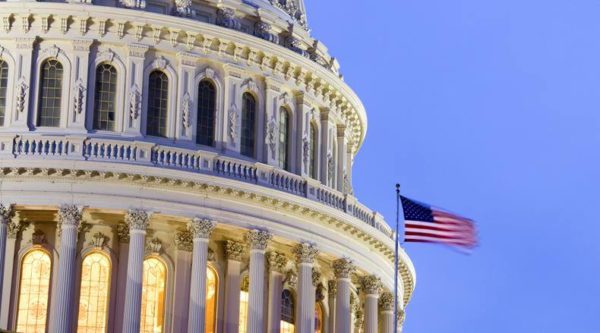
- Details
- By Levi Rickert
"In a politically divided country, Democrats were also split over the passage of a short-term spending bill that will keep the federal government running through the end of September. While the bill passed with members of Congress in both chambers voting mostly along party lines, there was evidence of division among Democratic senators, with 10 voting in favor of the measure."
The bill features a modest increase in defense spending while cutting approximately $13 billion from non-defense programs. It aligns with Republican commitments to reduce domestic expenditures. Democrats criticized the bill, calling it a "blank check" for President Donald Trump, as it does not restrict the administration’s ongoing efforts to slash previously approved congressional spending.
The vote underscores deep divisions within the Democratic Party on how to address Trump 2.0. Senate Minority Leader Chuck Schumer ( D-NY) faced strong backlash from House Democrats, who were nearly unanimous in opposing the funding bill after he chose to support it.
Rep. Alexandria Ocasio-Cortez (D-NY) called Schumer’s stance “a huge slap in the face.”
"I think there is a deep sense of outrage and betrayal and this is not just progressive Democrats — this is across the board, the entire party," New York Rep. Alexandria Ocasio-Cortez told reporters Thursday night at a party retreat in Leesburg, Virginia.
Among the senators voting in favor of the spending bill was Sen. Brian Schatz (D-HI), who is vice chairman of the U.S. Senate Committee on Indian Affairs.
In a statement, Schatz called his vote a “difficult and close call” but said he ultimately “made the determination that a flawed bill was better than no bill at all.”
“I understand people’s frustration — I share it,” Schatz said. “But Trump and the Republicans, who control both chambers of Congress, presented us with a bad choice and a worse choice. Both would produce terrible outcomes, but a shutdown would be more devastating for everyone.”
The only Native American in the U.S. House of Representatives, Rep. Sharice Davids (D-KS) who is a tribal citizen of the Ho-Chunk Nation, opposed the bill.
"While I support raising pay for newly enlisted service members, the bill threatens Social Security and Medicare, makes it harder for Kansans to afford rent, cuts investments for local infrastructure projects and public safety programs, and guts a bipartisan program that has expanded health care for 2,500 veterans in Kansas’ Third District exposed to toxins. It also hands unchecked power to Donald Trump and Elon Musk — the same two who have thrown our economy and democracy into chaos — to push massive tax breaks for their billionaire friends. Kansans deserve real, bipartisan solutions that lower costs, not more reckless power grabs." Davids said in a statement.
More Stories Like This
Native News Weekly (August 25, 2024): D.C. BriefsUS Presidents in Their Own Words Concerning American Indians
Indigenous Actor Elaine Miles Reports Detention by Alleged ICE Agents
Happy Thanksgiving from Native News Online
Coming Up on Native Bidaské: Behind the Animation: Joey Clift Talks “Pow” and Native Storytelling
Help us tell the stories that could save Native languages and food traditions
At a critical moment for Indian Country, Native News Online is embarking on our most ambitious reporting project yet: "Cultivating Culture," a three-year investigation into two forces shaping Native community survival—food sovereignty and language revitalization.
The devastating impact of COVID-19 accelerated the loss of Native elders and with them, irreplaceable cultural knowledge. Yet across tribal communities, innovative leaders are fighting back, reclaiming traditional food systems and breathing new life into Native languages. These aren't just cultural preservation efforts—they're powerful pathways to community health, healing, and resilience.
Our dedicated reporting team will spend three years documenting these stories through on-the-ground reporting in 18 tribal communities, producing over 200 in-depth stories, 18 podcast episodes, and multimedia content that amplifies Indigenous voices. We'll show policymakers, funders, and allies how cultural restoration directly impacts physical and mental wellness while celebrating successful models of sovereignty and self-determination.
This isn't corporate media parachuting into Indian Country for a quick story. This is sustained, relationship-based journalism by Native reporters who understand these communities. It's "Warrior Journalism"—fearless reporting that serves the 5.5 million readers who depend on us for news that mainstream media often ignores.
We need your help right now. While we've secured partial funding, we're still $450,000 short of our three-year budget. Our immediate goal is $25,000 this month to keep this critical work moving forward—funding reporter salaries, travel to remote communities, photography, and the deep reporting these stories deserve.
Every dollar directly supports Indigenous journalists telling Indigenous stories. Whether it's $5 or $50, your contribution ensures these vital narratives of resilience, innovation, and hope don't disappear into silence.
 The stakes couldn't be higher. Native languages are being lost at an alarming rate. Food insecurity plagues many tribal communities. But solutions are emerging, and these stories need to be told.
The stakes couldn't be higher. Native languages are being lost at an alarming rate. Food insecurity plagues many tribal communities. But solutions are emerging, and these stories need to be told.
Support independent Native journalism. Fund the stories that matter.
Levi Rickert (Potawatomi), Editor & Publisher

